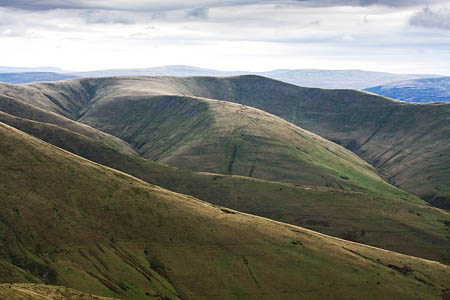Two mountain rescue teams worked jointly over the weekend to ensure the safety of more than 2,500 competitors in one of the most popular challenge events.
Kendal and Kirkby Stephen Mountain Rescue Teams provided safety cover for the Original Mountain Marathon, which was run in the Howgill Fells.
Working in pairs the teams taking part in the OMM have to navigate between checkpoints in remote mountainous terrain and be self-sufficient for the entire period of the race.
The Howgills, the wide band of high fells and deep valleys to the east of the Lake District, was last used for the event in 1998.
A Kirkby Stephen MRT spokesperson explained: “All British mountain rescue teams have agreed operational areas, based to a large extent on the time it would take a team to reach an incident.
“The Howgills are split between two teams, with the northern part lying in Kirkby Stephen MRT’s operational area and the southern part in Kendal’s. Given the scale of the event the two teams made advance plans to work closely throughout the weekend.
“Kirkby Stephen MRT’s base in Kirkby Stephen was used as the joint control centre, with Kendal MRT’s specialist control vehicle deployed at different locations during each day, to help with communications and the management of any incidents.
“Other neighbouring mountain rescue teams were briefed in advance and declared themselves available to assist if required.”
Eddie Harrison, team leader of Kendal MRT said: “It’s very pleasing to have such a large number of people visiting such a fabulous group of hills, with many perhaps being introduced to them for the first time.
“The environment in the Howgills offers plenty of challenges for a competitive event such as the OMM but, for a normal day out in the hills, they are usually splendidly quiet with stunning views across the Lake District fells, Morecambe Bay and the Eden Valley.”
Arthur Littlefair, team leader of Kirkby Stephen MRT, added: “Between us we had over 70 volunteer mountain rescue team members on standby, in position on the hill or in vehicles at the roadside ready to respond.
“It made absolute sense to co-ordinate our personnel and resources so that we could reach any incident as quickly as possible, with adequate numbers to deal with casualties and evacuate them if necessary.
“With 2,500 people taking part in the OMM, there was always the possibility we would have to call in neighbouring mountain rescue and search dog teams, and we needed to have a well planned, centralised, way of briefing and using them, should that need arise.”
The 2012 OMM took place in mixed weather, with clear skies for much of Saturday, a cold night and deteriorating conditions, including mist and rain, on Sunday.
The mountain rescue teams dealt with two incidents over the weekend.
One was on The Calf, the highest hill in the Howgills and within the OMM event area, involving a walker not connected with the race.
Both teams responded and the casualty, suffering from a lower leg injury, was airlifted by air ambulance to Royal Preston Hospital.
A second incident was dealt with Kendal MRT team at the registration building at Sedbergh. A severely hypothermic casualty was treated before an ambulance took him to hospital in Lancaster.
